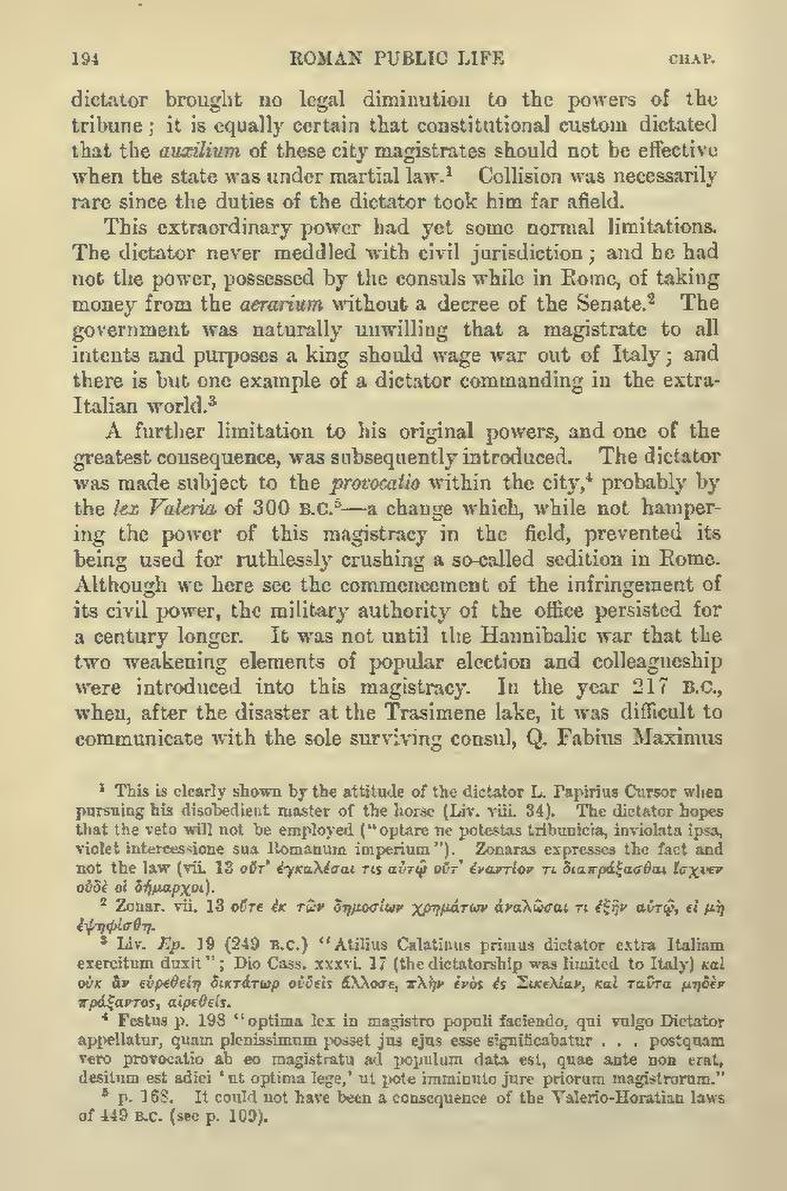dictator brought no legal diminution to the powers of the tribune; it is equally certain that constitutional custom dictated that the auxilium of these city magistrates should not be effective when the state was under martial law.[1] Collision was necessarily rare since the duties of the dictator took him far afield.
This extraordinary power had yet some normal limitations. The dictator never meddled with civil jurisdiction; and he had not the power, possessed by the consuls while in Rome, of taking money from the aerarium without a decree of the Senate.[2] The government was naturally unwilling that a magistrate to all intents and purposes a king should wage war out of Italy; and there is but one example of a dictator commanding in the extra-Italian world.[3]
A further limitation to his original powers, and one of the greatest consequence, was subsequently introduced. The dictator was made subject to the provocatio within the city,[4] probably by the lex Valeria of 300 B.C.[5]—a change which, while not hampering the power of this magistracy in the field, prevented its being used for ruthlessly crushing a so-called sedition in Rome. Although we here see the commencement of the infringement of its civil power, the military authority of the office persisted for a century longer. It was not until the Hannibalic war that the two weakening elements of popular election and colleagueship were introduced into this magistracy. In the year 217 B.C., when, after the disaster at the Trasimene lake, it was difficult to communicate with the sole surviving consul, Q. Fabius Maximus).].].]
- ↑ This is clearly shown by the attitude of the dictator L. Papirius Cursor when pursuing his disobedient master of the horse (Liv. viii. 34). The dictator hopes that the veto will not be employed ("optare ne potestas tribunicia, inviolata ipsa, violet intercessione sua Romanum imperium"). Zonaras expresses the fact and not the law (vii. 13 [Greek: out' enkalesai tis autô out' enantion ti diapraxasthai ischyen oude hoi dêmarchoi
- ↑ Zonar. vii. 13 [Greek: oute ek tôn dêmosiôn chrêmatôn analôsai ti exên autô, ei mê epsêphisthê
- ↑ Liv. Ep. 19 (249 B.C.) "Atilius Calatinus primus dictator extra Italiam exercitum duxit"; Dio Cass. xxxvi. 17 (the dictatorship was limited to Italy) [Greek: kai ouk an heuretheiê diktatôr oudeis allose, plên henos es Sikelian, kai tauta mêden praxantos, hairetheis
- ↑ Festus p. 198 "optima lex in magistro populi faciendo, qui vulgo Dictator appellator, quam plenissimum posset jus ejus esse significabatur . . . postquam vero provocatio ab eo magistratu ad populum data est, quae ante non erat, desitum est adici 'ut optima lege,' ut pote imminuto jure priorum magistrorum."
- ↑ p. 168. It could not have been a consequence of the Valerio-Horatian laws of 449 B.C. (see p. 109).
